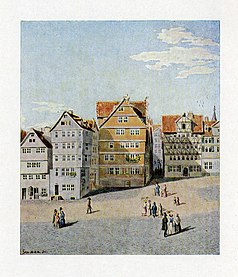Ludwig Emil Grimm
Ludwig Emil Grimm | |
|---|---|
 Self-portrait (1813) | |
| Born | March 14, 1790 |
| Died | April 4, 1863 (aged 73) |
| Known for | Painter, art professor, etcher and copper engraver |
| Notable work | Farmer's wife from Egern with her daughters (1813), Frontispiece to Grimm's Fairy Tales (1819), The Johannisfriedhof in Nuremberg (1828), Double portrait of Jacob and Wilhelm (1843), Marstaellerplatz in Kassel (1844) |
Ludwig Emil Grimm (14 March 1790[1] – 4 April 1863) was a German painter, art professor, etcher and copper engraver.
Early life
Grimm was born in Hanau, Germany, in 1790. His brothers Jacob and Wilhelm Grimm were folklorists.[2]
Education
Grimm studies began at the Kunsthochschule Kassel and Philip Otto Runge,[3] then from 1809 to 1817, he studied at Academy of Fine Arts Munich.
In the 1814, he worked as an officer in the campaign against Napoleon.[3]
In 1816, he travelled to Italy where he learned engraving from Carl Ernst Christoph Hess[4] and published his first work; a sketchbook of engravings based on his Italian journey.
Career
In 1819, Grimm contributed the frontispiece for the second edition of Kinder- und Hausmärchen (Grimm's Fairy Tales).
In 1823 and 1826 he was able to secure commissions for two series of portraits of scholars, professors and doctors, thanks to his brothers' connections to the academic community in Göttingen.
In 1832, he helped Gerhardt Wilhelm von Reutern found the artists' colony in Willingshausen where he became a Professor of history painting at the Kassel Academy.[4]
In 1842, two years after his first wife's death, he married the daughter of Reform theologian Christoph Friedrich Wilhelm Ernst.
Death
In 1863, he died of pneumonia in Kassel.
Legacy
In 2012, the city of Hanau has awarded the "Ludwig Emil Grimm Prize" to young artists.
In 2014, a life-size bronze statue of him was dedicated there in front of the "Zum Riesen" hotel as a gift to the city from the hotel's owners, which was designed by the painter Joerg Eyfferth.
Writings
- Erinnerungen aus meinem Leben (Memoirs of My Life), edited with commentary by Adolf Stoll. Hesse & Becker, Leipzig 1911 (Digitalized).
Selected works
-
Farmer's wife from Egern with her daughters (1813)
-
The Johannisfriedhof in Nuremberg (1828)
-
Frontispiece to Grimm's Fairy Tales (1819)
-
Marstaellerplatz in Kassel (1844)
-
Double portrait of Jacob and Wilhelm (1843)
References
- ^ Martus, Steffen (2009). Die Brüder Grimm: Eine Biographie. Rowohlt Verlag GmbH. ISBN 978-3871345685.
- ^ "Jacob and Wilhelm Grimm. Kinder- und Hausmärchen. Göttingen: Dieterich, 1837. First enlarged (unabridged edition), a... (Total: 2 )". historical.ha.com. Heritage Auctions. 30 November 2020. Retrieved 24 August 2022.
Jacob and Wilhelm Grimm. Kinder- und Hausmärchen. Göttingen: Dieterich, 1837. First enlarged (unabridged edition), and third edition overall. An important presentation copy, inscribed by Wilhelm Grimm, "to dear Malchen Hassenpflug from her true friend..." Two volumes. Small octavo. xxviii, 513 [but see below]; vi, 385 pages. Each with steel-engraved frontispiece designed by Ludwig Emil Grimm
- ^ a b Heinz H. Biehn (1966), "Grimm, Ludwig Emil", Neue Deutsche Biographie (in German), vol. 7, Berlin: Duncker & Humblot, pp. 81–82; (full text online)
- ^ a b ADB:Grimm, Ludwig Emil (1879), "Grimm, Ludwig Emil", Allgemeine Deutsche Biographie (in German), vol. 9, Leipzig: Duncker & Humblot, pp. 689–690
- Herbert von Bose: Das Bild des Fremden im Werk von Ludwig Emil Grimm (1790-1863) (Images of the Strange in the Work of...) Tectum Verlag, Marburg 2007, ISBN 978-3-8288-9451-8
External links
- Literature by and about Ludwig Emil Grimm in the German National Library catalogue
- There is literature about Ludwig Emil Grimm in the Hessian Bibliography
- Brüder Grimm-Museum Kassel and Brüder Grimm-Gesellschaft [1]
- Malerkolonie Willingshausen





